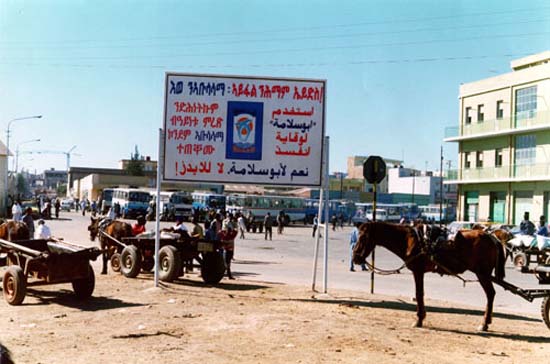
Star Wars Vs. Real Warsby Eritrea RPCV John Rude
Star Wars Vs. Real Wars
by John Rude
We all know what war is about, don’t we? We saw “Saving Private Ryan” and came away understanding war as experienced by our fathers. Or we viewed the latest episode of “Star Wars,” thankful that it all takes place in the future—or was it the past? But, unless we are veterans of a conflict involving U.S. intervention, we have to admit that for Americans, war is little more than a fantasy, enhanced by special effects.
I’ve never seen actual combat, but war has been a constant reality in my life for the past year. By a strange quirk of circumstances, some years earlier I had crossed a boundary and joined another culture. Last year, my adopted country stumbled into what has become the world’s largest forgotten war.
The miracles of technology have been bringing friends and combatants from afar to my home each day. Cluster bombs exploded on my computer screen only hours after they sliced through real bodies in villages that I had visited and taught in. Videotapes of real battles arrived weeks after they were fought. The images were so real, I almost got a whiff of cordite and rotting human flesh.
My war is being fought in Eritrea, a country so marginal that people who ask me why my brow is constantly furrowed call it “Eriwhat?” Still, my friends and family know Eritrea is my heart’s home.
If you know anything about Eritrea (and few people do) you realize that this African nation was carved out of 30 years of sacrifice. When I taught there in the early 1960s, 200 hopeful faces peered up at me, arms eagerly waving to answer my verbal quizzes. (Verbal because there were no books or chalk-boards.) Of those 200 students, less than half were alive after Eritrea won its independence from a brutal Ethiopian regime in 1991.
When Eritrea joined the United Nations in 1993, the nation had to re-build from ground zero. The homes, schools and farms of my friends had been devastated by a generation of war.
In the recent struggle with Ethiopia, veterans of Eritrea’s long war for independence joined newly trained soldiers in massive numbers all along the boundary. They were determined not to yield an inch of their beloved land.
A friend’s 23 year-old daughter was given a Kalashnikov rifle and whisked off to the border. Once they arrived, the impromptu soldiers waved their guns threateningly, or used them as clubs, because ammunition had not arrived. Men and women who had just been living normal city lives slept in trenches for months on end, wearing the single set of clothing they had been issued, through drenching rain and blazing sun.
When the ammunition and tanks and fighter-bombers finally arrived (supplied by arms merchants from wealthy nations) Ethiopians and Eritreans killed each other by the hundreds, then thousands. In a single day—the same day NATO began bombing Yugoslavia—more than 10,000 soldiers from each side perished. With 500,000 combatants, the Ethiopia-Eritrea border conflict was the largest and most deadly war being fought anywhere this year––yet it didn’t make it to the back pages of our newspapers.
American politicians were preoccupied with high-tech killing, European security, and memories of the Holocaust. There must be a hierarchy of Holocausts—the ones in Africa apparently don’t matter, as the U.S. government showed so convincingly in Rwanda and Somalia.
War is madness, dressed impeccably in the language of patriotism and victimi-zation. Once the killing starts, it feeds on itself, growing more brutal and seemingly justifiable each day. Wars of genocide, wars of liberation, high-tech wars and primitive wars all have the same result. People are wounded, amputated, blinded or simply obliterated in ways that Holly-wood special-effects crews can never capture on film. For every “Star Wars” that rakes in millions of dollars, dozens of real wars snuff out millions of lives.
Joseph Stalin said: “Kill one person and it’s a tragedy; kill a million, and it’s a statistic.” Here is a statistic that the media hasn’t quite been able to grasp: in the decade since the end of the Cold War, 8,671,300 lives have been lost in twenty-nine ethnic and international conflicts. This is equivalent to two Nazi Holocausts. Is this the “peace dividend” we were all looking for when the Iron Curtain fell? It is for Americans, who experience only imaginary wars. For the rest of the world, a different reality reigns.
For my friend who lies in a poorly equipped hospital in Eritrea, there is no peace; only a burning scar left by the fragment of a cluster bomb that ripped through her stomach. Imaginary war is just one more American luxury she cannot afford.
If she should happen to die, this will be a tragedy, not a statistic. And yet, her fate is a fate that awaits us all. Even as you read this, your life is slipping through your hands. The shortness of lives cut down by war should not paralyze us. It should force us out of the fog, into undiluted, concentrated living. Our task, and hers, is to discover what is truly essential.
What can we do to stop war, when we aren’t even sure where it’s happening? We can challenge the media to stop their practice of saturation reporting—from O.J. to Monica to Kosovo. We can link ourselves to people in nations that suffer from American intervention and neglect. We can become informed. We can get real—forgetting about Star Wars, and making the forgotten struggles of people who are begging for our compassionate attention, Our Wars.
John Rude formerly wrote a column for the Salem Statesman-Journal. He will be featured regularly in Alternatives, connecting our world with the “Real World.” John served in the Peace Corps in Eritrea from 1962-64, and has led tours there in recent years. News about Eritrea (with links to other sites) is available at www.dehai.org.
